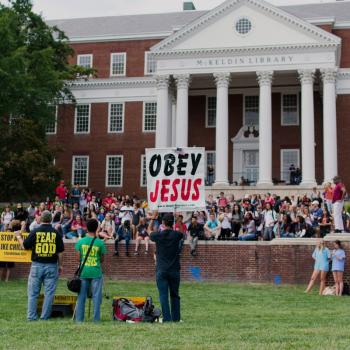Mary Eberstadt in her new book, It’s Dangerous to Believe: Religious Freedom and Its Enemies, says Christian have it rough:
In short, what many Western men and women of faith feel to the marrow these days is fear. Fear that they will lose the good opinion of their neighbors, family and friends — because traditional Christianity, especially, is said over and over to stand on the wrong side of history; because religious faith of that particular kind is denigrated across popular culture, and disdained as retrograde or worse in many citadels of higher learning.
Michael Sean Winters feels Eberstadt’s pain but doesn’t think it is proper to Christians:
Oh, my God! The next thing you know, you might be disinvited from the best cocktail parties or snubbed at the club! This catalogue of upper-middle class anxieties — not getting the right internship, being shunned in professional circles, worrying about appearing “too religious” — this is not the danger of the Gospel. It is dangerous to believe because we are called to believe that “He has cast down the mighty from their thrones, and has lifted up the lowly; He has filled the hungry with good things, and the rich he has sent away empty,” in short, that God’s values are not the values of the world, and that the Christian is called to take up his cross and follow Him.
Then we have the insults that Calvinists must endure:
Among the many things that some Christians believe one is the doctrine of Total depravity. It goes along with Unconditional election, Limited atonement, Irresistible grace and Perseverance of the Saints to form the backbone of American Calvinism, TULIP.
I am not going to argue whether these are or are not adequate characterizations of Christian theology. I am interested in the apparent effect that the TULIP doctrine, deeply influential in American Christian circles, has on American public discourse. At least in my experience the effect is clear: it leads to demonization of one’s opponents and an inability to articulate a complex understanding of human nature and human society.
(The funny thing about this fear of Calvinism is that it reduces Calvinists to an idea in the same way that Calvinism allegedly reduces people to two kinds — either a Calvinist or not.)











